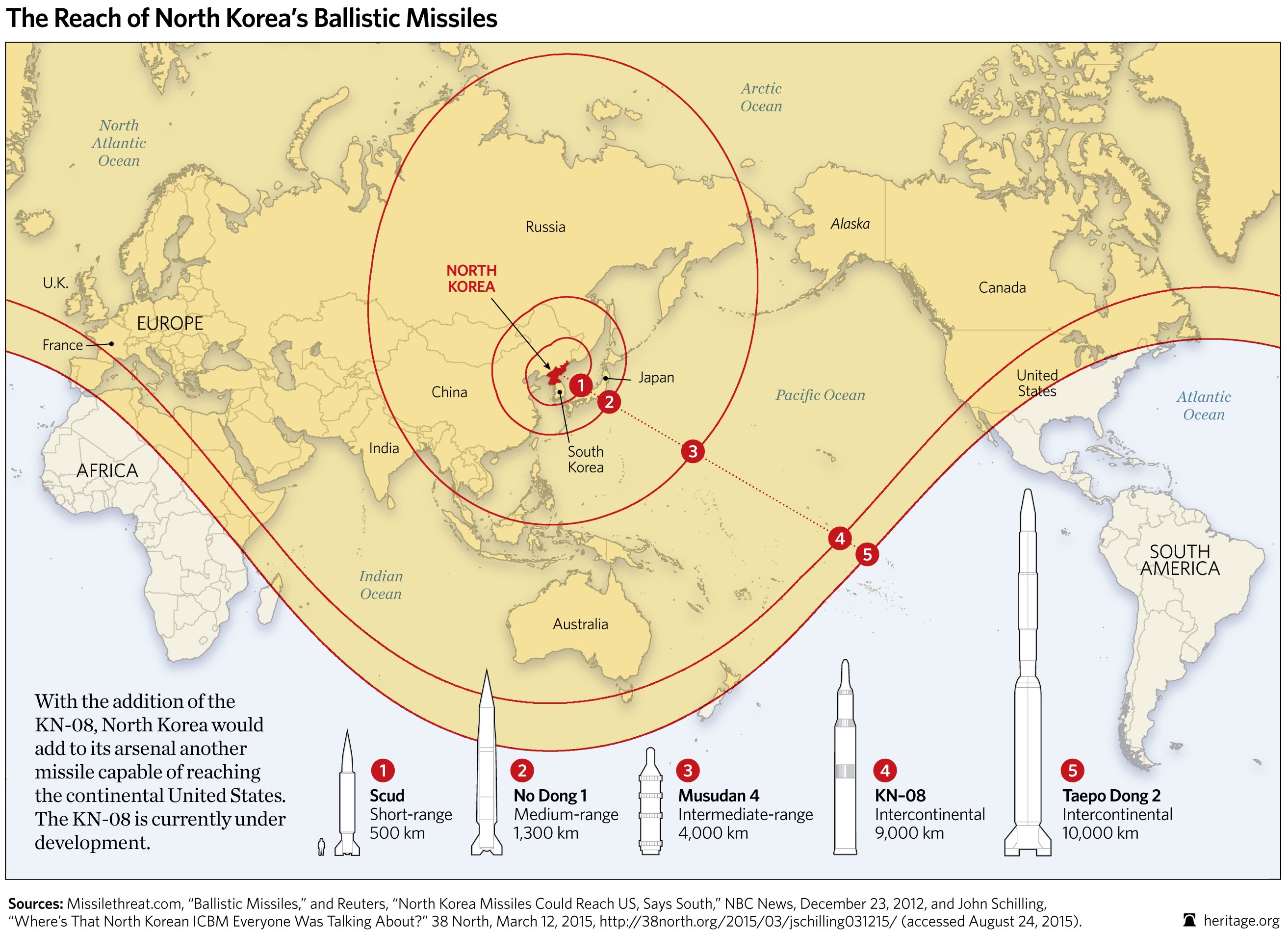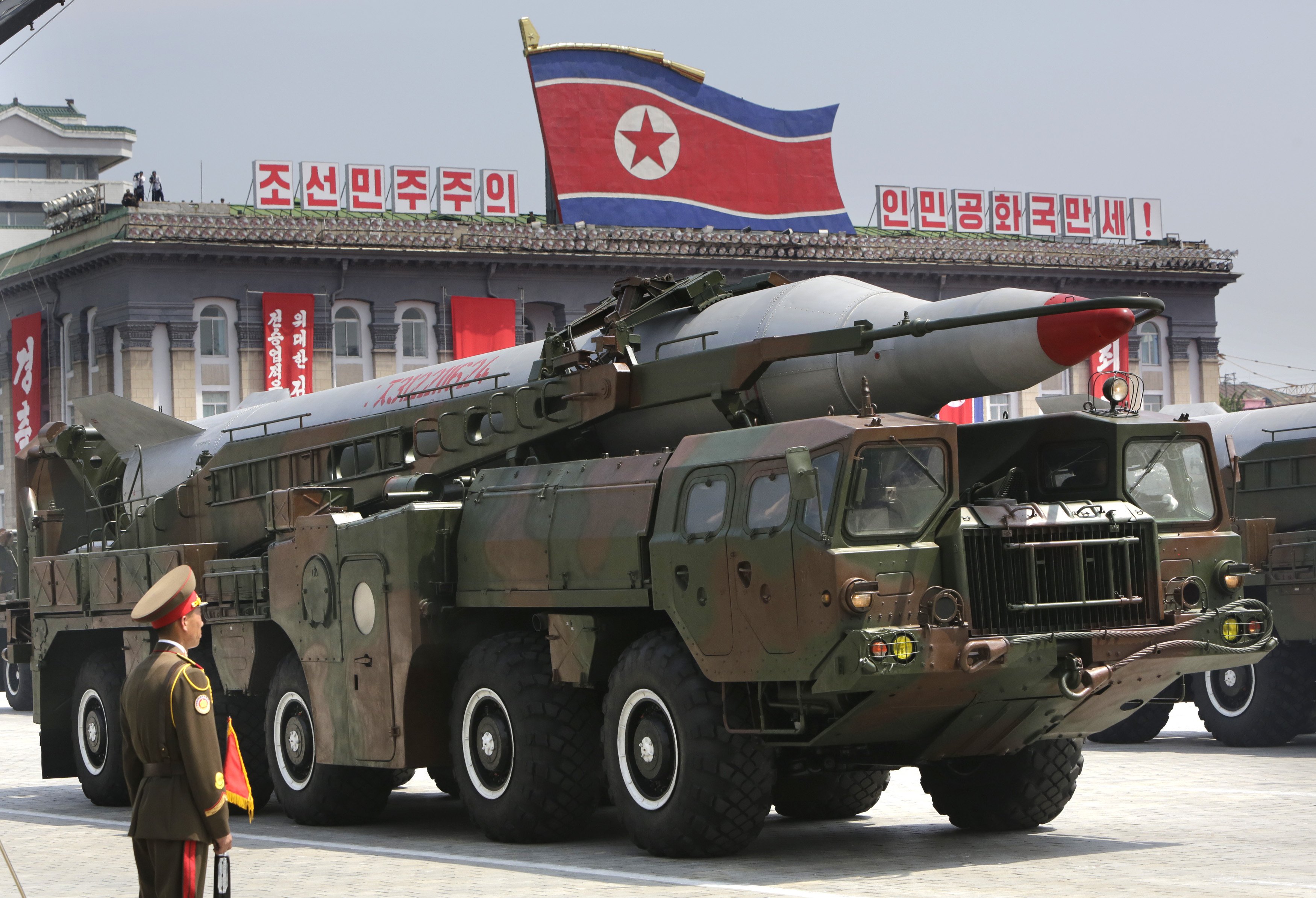North Korea now has a range of ballistic missiles that are thought to be capable of hitting both the US mainland and American interests throughout the Pacific, The Heritage Foundation reports in its 2016 Index of US Military Strength.
The annual report examines the strength of the US military, and also takes into account potential rising threats to the US and its allies from across the world. According to Heritage, the threat from the nuclear-armed, anti-American authoritarian state will only get more complicated in 2016.
Pyongyang has continued to develop of a range of ballistic missiles, at the same time the regime pushes to create miniaturized nuclear warheads that can be placed atop those missiles. If constructed, these warheads would allow Pyongyang to hypothetically launch long-range nuclear strikes, as this graphic from Heritage demonstrates:

“North Korea has an extensive ballistic missile force that could strike South Korea, Japan, and US military bases in Asia,” the report states. “Pyongyang has deployed at least 400 Scud short-range tactical ballistic missiles, 300 No-Dong medium-range missiles, and 100 to 200 Musudan intermediate-range ballistic missiles.”
The longest-range missile, the Taepo Dong 2, is still in development. However, if deployed, the missile is believed to be nuclear capable if North Korea ever succeeded in miniaturizing nuclear warheads.
The most serious of North Korea’s missile threats comes from the country’s KN-08 missile. The KN-08 is a road-mobile intercontinental missile, meaning Pyongyang can move the launch system throughout the country. In contrast, other long-range missiles must be fired from stationary launch pads.
“It’s the relocatable target set that really impedes our ability to find, fix, and finish the threat,” Adm. Bill Gortney, the commander of NORAD, told reporters in April 2015. “And as the targets move around and we if don’t have the persistent stare and persistent [intelligence, surveillance, and reconnaissance] that we do not have over North Korea at this time, that relocatable nature makes it very difficult for us to counter it.”
Heritage notes that Gortney also said in April 2015 that the KN-08 “is operational today. Our assessment is that they have the ability to put a nuclear weapon on a KN-08 and shoot it at the homeland.”
A missile is carried by a military vehicle during a parade to commemorate the 60th anniversary of the signing of a truce in the 1950-1953 Korean War, at Kim Il-sung Square in Pyongyang July 27, 2013.

In an article for Johns Hopkins University’s 38 North, North Korea experts John Schilling and Henry Kan estimate that the KN-08 would have a maximum range of 5,600 miles, making the missile capable of hitting the West Coast of the continental US.
The weapon, however, is unlikely to have the accuracy required for precision targeting on large US cities. And although the Pyongyang may soon develop the capability needed to launch missiles towards the US, it’s still possible that it wouldn’t be able to evade existing US missile defenses.
“Should [a missile] get airborne and come at us, I’m confident we would be able to knock it down,” Gortney told reporters.


 North Korea launches missiles into Japan Sea because it’s just that time again
North Korea launches missiles into Japan Sea because it’s just that time again North Korea launches missiles over Japan, activating J-Alert warning system
North Korea launches missiles over Japan, activating J-Alert warning system North Korea fires new missile over Japan, residents woken by government warning systems
North Korea fires new missile over Japan, residents woken by government warning systems 【Newsflash】 North Korea Launches “Long-Range Rocket” in Suspected Missile Technology Test
【Newsflash】 North Korea Launches “Long-Range Rocket” in Suspected Missile Technology Test North Korea shows military prowess by bludgeoning a wide range of ceramics【Video】
North Korea shows military prowess by bludgeoning a wide range of ceramics【Video】 Japan has omurice chocolate, and the weirdest thing isn’t how it tastes
Japan has omurice chocolate, and the weirdest thing isn’t how it tastes Downloads of 39-year-old Guns N’ Roses song increase 12,166 percent thanks to Gundam
Downloads of 39-year-old Guns N’ Roses song increase 12,166 percent thanks to Gundam A look back on 40 years of Japanese schools banning stuff
A look back on 40 years of Japanese schools banning stuff Swapping seats on Japan’s bullet trains is not allowed, Shinkansen operator says
Swapping seats on Japan’s bullet trains is not allowed, Shinkansen operator says And now, we eat a bear paw we bought in Japan’s Chiba Prefecture【Taste test】
And now, we eat a bear paw we bought in Japan’s Chiba Prefecture【Taste test】 Take a trip to Japan’s Dododo Land, the most irritating place on Earth
Take a trip to Japan’s Dododo Land, the most irritating place on Earth Taiwanese Cosplayers Appear in their Droves, Show All-Out Passion for Hatsune Miku
Taiwanese Cosplayers Appear in their Droves, Show All-Out Passion for Hatsune Miku Visiting Shohei Ohtani’s official manhole lid in his hometown and more
Visiting Shohei Ohtani’s official manhole lid in his hometown and more Nakagin Capsule Tower’s rare “pink capsules”, formerly used in the sex industry
Nakagin Capsule Tower’s rare “pink capsules”, formerly used in the sex industry 35 fascinating photos of Korea from 100 years ago (before K-dramas took over Asia)
35 fascinating photos of Korea from 100 years ago (before K-dramas took over Asia) Is China’s don’t-go-to-Japan warning affecting the lines at a popular Tokyo gyukatsu restaurant?
Is China’s don’t-go-to-Japan warning affecting the lines at a popular Tokyo gyukatsu restaurant? Three beautiful places to see Japan’s plum blossoms after starting your day in downtown Tokyo
Three beautiful places to see Japan’s plum blossoms after starting your day in downtown Tokyo Cherry blossom forecasts map shows Japan’s OTHER sakura season is starting right now
Cherry blossom forecasts map shows Japan’s OTHER sakura season is starting right now Huge Evangelion Unit-01 head appearing in lights in Japan to celebrate anime’s 30th anniversary
Huge Evangelion Unit-01 head appearing in lights in Japan to celebrate anime’s 30th anniversary New Studio Ghibli stamps leave an impression on your stationery…and your heart
New Studio Ghibli stamps leave an impression on your stationery…and your heart Family Mart releases huge range of cute sweets for Cat Day in Japan
Family Mart releases huge range of cute sweets for Cat Day in Japan Japan’s first all-matcha ramen restaurant is now open in Kyoto【Photos】
Japan’s first all-matcha ramen restaurant is now open in Kyoto【Photos】 Japan’s most famous Mt. Fuji view park cancels cherry blossom festival because of overtourism
Japan’s most famous Mt. Fuji view park cancels cherry blossom festival because of overtourism Starbucks Japan releases new drinkware and goods for Valentine’s Day
Starbucks Japan releases new drinkware and goods for Valentine’s Day Japan releases first official sakura cherry blossom forecast for 2026
Japan releases first official sakura cherry blossom forecast for 2026 Archfiend Hello Kitty appears as Sanrio launches new team-up with Yu-Gi-Oh【Pics】
Archfiend Hello Kitty appears as Sanrio launches new team-up with Yu-Gi-Oh【Pics】 China’s don’t-go-to-Japan warning looks to be affecting tourist crowds on Miyajima
China’s don’t-go-to-Japan warning looks to be affecting tourist crowds on Miyajima Starbucks Japan releases new Frappuccino and latte for Valentine’s Day
Starbucks Japan releases new Frappuccino and latte for Valentine’s Day Studio Ghibli releases new “komorebi” plush toys from Princess Mononoke and Spirited Away
Studio Ghibli releases new “komorebi” plush toys from Princess Mononoke and Spirited Away Yokai are descending upon Tokyo this spring in the latest immersive art experience
Yokai are descending upon Tokyo this spring in the latest immersive art experience Japan’s Naruto theme park now offering real-world version of Minato’s kunai ninja weapon
Japan’s Naruto theme park now offering real-world version of Minato’s kunai ninja weapon Our 52-year-old pole dancing reporter shares his tips for achieving your New Year’s exercise goal
Our 52-year-old pole dancing reporter shares his tips for achieving your New Year’s exercise goal Survey asks foreign tourists what bothered them in Japan, more than half gave same answer
Survey asks foreign tourists what bothered them in Japan, more than half gave same answer Japan’s human washing machines will go on sale to general public, demos to be held in Tokyo
Japan’s human washing machines will go on sale to general public, demos to be held in Tokyo We deeply regret going into this tunnel on our walk in the mountains of Japan
We deeply regret going into this tunnel on our walk in the mountains of Japan Studio Ghibli releases Kodama forest spirits from Princess Mononoke to light up your home
Studio Ghibli releases Kodama forest spirits from Princess Mononoke to light up your home Major Japanese hotel chain says reservations via overseas booking sites may not be valid
Major Japanese hotel chain says reservations via overseas booking sites may not be valid Put sesame oil in your coffee? Japanese maker says it’s the best way to start your day【Taste test】
Put sesame oil in your coffee? Japanese maker says it’s the best way to start your day【Taste test】 No more using real katana for tourism activities, Japan’s National Police Agency says
No more using real katana for tourism activities, Japan’s National Police Agency says Starbucks Japan reveals new sakura drinkware collection, inspired by evening cherry blossoms
Starbucks Japan reveals new sakura drinkware collection, inspired by evening cherry blossoms Updated cherry blossom forecast shows extra-long sakura season for Japan this year
Updated cherry blossom forecast shows extra-long sakura season for Japan this year Close call – Passenger plane passed through North Korean missile trajectory just 6 minutes later
Close call – Passenger plane passed through North Korean missile trajectory just 6 minutes later Many Japanese workers told by workplaces during missile scare: “Please come to work as usual”
Many Japanese workers told by workplaces during missile scare: “Please come to work as usual” The power of fast food: Supreme Leader Kim Jong-un wants McDonald’s to invest in North Korea
The power of fast food: Supreme Leader Kim Jong-un wants McDonald’s to invest in North Korea Musician Ian McCulloch flees Japan amid US-North Korea tensions, show cancelled without warning
Musician Ian McCulloch flees Japan amid US-North Korea tensions, show cancelled without warning North Korea missile alert manga produced by Japanese government office
North Korea missile alert manga produced by Japanese government office Wait, did North Korea really just call South Korea’s president a “blabbering peasant woman”?
Wait, did North Korea really just call South Korea’s president a “blabbering peasant woman”? North Korea-U.S. tensions spark interest in Japanese government’s J-Alert warning system
North Korea-U.S. tensions spark interest in Japanese government’s J-Alert warning system North Korea claims successful hydrogen bomb test, world very skeptical
North Korea claims successful hydrogen bomb test, world very skeptical North Korea Discovers “Unicorn Nest”, Proves to Kids that it’s OK to Dream Big
North Korea Discovers “Unicorn Nest”, Proves to Kids that it’s OK to Dream Big World on high alert as North Korea flexes its video FX muscle【Video】
World on high alert as North Korea flexes its video FX muscle【Video】 Hilarious GIF shows what could have happened to Moon Jae-in when he stepped into North Korea
Hilarious GIF shows what could have happened to Moon Jae-in when he stepped into North Korea Shortwave radio at our cheap country house in Japanese mountains picks up North Korean broadcast
Shortwave radio at our cheap country house in Japanese mountains picks up North Korean broadcast
Leave a Reply